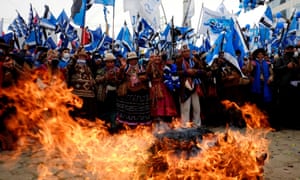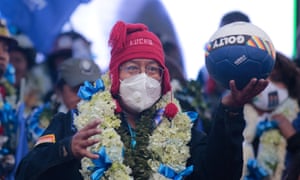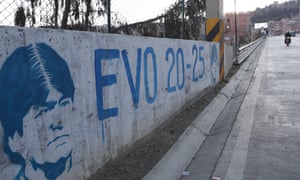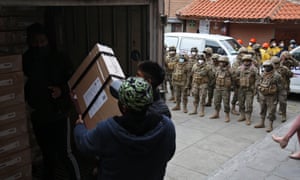
Supporters take part in an offering to the Pachamama (Mother Earth) during a closing campaign rally of the Movement to Socialism party (Mas) ahead of the Bolivian presidential election, in El Alto, on Wednesday. Photograph: David Mercado/Reuters
A year after the country’s first indigenous president was controversially ousted,
(CIA COUP BY INEPT RIGHTWINGERS)
his party is well placed to win a rerun presidential election
by Tom Phillips and Cindy Jiménez Bercerra in La Paz
Sat 17 Oct 2020
David Ticona Mamani felt despair and foreboding when Evo Morales was forced from his Andean homeland last November amid civil unrest, electoral meltdown and what supporters of Bolivia’s first indigenous president called a racist, rightwing coup.
“I wept,” remembered the 56-year-old lawyer, a fervent supporter of Morales and his Movimiento al Socialismo (Mas).
Silence reigns on the US-backed coup against Evo Morales in Bolivia
Mark Weisbrot
“Evo represents the rebirth of Bolivia’s indigenous people. He gave us back our self-esteem, our pride in being indigenous, of having indigenous surnames, of our food … Evo Morales was Bolivia’s best president ever.”
With Morales condemned to exile – first in Mexico, now Argentina - believers such as Mamani were left politically orphaned and the Mas in disarray.
Jeanine Áñez, a rightwing senator who once branded Bolivia’s indigenous people “satanic”, took power as caretaker president bringing a sudden and shocking end to nearly 14 years of leftwing rule during which the country’s long-excluded originarios (native peoples) finally took centre stage.
Activists have since accused Áñez’s government of using the justice system to wage a politically motivated witch-hunt against Morales and his allies.
But nearly 12 months after last year’s convulsion, Morales’ Movement Towards Socialism could be about to pull off a sensational political comeback in Sunday’s twice-postponed presidential election.
by Tom Phillips and Cindy Jiménez Bercerra in La Paz
Sat 17 Oct 2020
David Ticona Mamani felt despair and foreboding when Evo Morales was forced from his Andean homeland last November amid civil unrest, electoral meltdown and what supporters of Bolivia’s first indigenous president called a racist, rightwing coup.
“I wept,” remembered the 56-year-old lawyer, a fervent supporter of Morales and his Movimiento al Socialismo (Mas).
Silence reigns on the US-backed coup against Evo Morales in Bolivia
Mark Weisbrot
“Evo represents the rebirth of Bolivia’s indigenous people. He gave us back our self-esteem, our pride in being indigenous, of having indigenous surnames, of our food … Evo Morales was Bolivia’s best president ever.”
With Morales condemned to exile – first in Mexico, now Argentina - believers such as Mamani were left politically orphaned and the Mas in disarray.
Jeanine Áñez, a rightwing senator who once branded Bolivia’s indigenous people “satanic”, took power as caretaker president bringing a sudden and shocking end to nearly 14 years of leftwing rule during which the country’s long-excluded originarios (native peoples) finally took centre stage.
Activists have since accused Áñez’s government of using the justice system to wage a politically motivated witch-hunt against Morales and his allies.
But nearly 12 months after last year’s convulsion, Morales’ Movement Towards Socialism could be about to pull off a sensational political comeback in Sunday’s twice-postponed presidential election.
Luis Arce, the presidential candidate of Evo Morales’s Mas party, holds a ball during his closing rally in El Alto. Photograph: Gaston Brito Miserocchi/Getty Images
The vote is a rerun of the doomed October 2019 election which was voided after incendiary claims of electoral fraud from the Organization of American States (OAS) fuelled protests and saw Morales resign under pressure from security forces.
Polls suggest the Mas candidate, Morales’s UK-educated former finance minister Luis Arce, has the edge over his main challenger, a centrist journalist and former president called Carlos Mesa.
“They [Mas] are in the driver’s seat and if they can mobilize voters this weekend – and they are the only party with the capacity to do that – they could do very well,” said Eduardo Gamarra, a Bolivia expert at Florida International University.
Gamarra thought a second round – which 67-year-old Mesa would probably win – remained the more likely prospect. If no candidate secures an outright majority, or 40% of the votes with 10% breathing space, a run-off will be held on 29 November. The third major candidate is Luis Fernando Camacho of the new rightwing Creemos (“We believe”) alliance. Áñez withdrew her candidacy last month saying she did not want to split the conservative vote.
But because Morales’s rivals had “atomized” the anti-Mas vote, it was not far-fetched to imagine that Arce, a softly spoken career civil servant who boasts a master’s degree from the University of Warwick, might triumph at the first time of asking.
“There is quite possibly a scenario where the Mas essentially picks up where it left off, only with Luis Arce as president,” said Gamarra.
Advertisement
Arce talked up that possibility on Wednesday at his final campaign rally – a high-altitude celebration of flag waving and dance in El Alto, a bastion of Morales support above the de facto capital La Paz.
A graffiti of the former president Evo Morales in La Paz. The exiled Morales still overshadows Bolivian politics. Photograph: Juan Karita/AP
“They thought they were going to kill the Movement Towards Socialism. But we’re here in El Alto to tell them: ‘We’re here and we’re alive!’” the 57-year-old candidate told supporters clad in the group’s blue, white and black colours.
“The right robbed the people and have shown their inability to govern,” Arce added in reference to charges that Áñez and her cabinet took power illegitimately and botched the response to Covid-19, which has killed thousands of Bolivians.
Mamani was also hopeful of a first-round victory and believed Arce could “relaunch” Bolivia.
But, like many Mas voters, he feared “a monumental fraud” was being cooked up with the acquiescence of the United States and the OAS, whose disputed claims about vote rigging in last year’s election played a key role in forcing Morales overseas.
This week a senior US state department official maintained Morales’s claim to have won the 2019 election was “the product of massive fraud” and hinted support for an Arce presidency was not completely assured.
“We look forward to working with whomever the Bolivians freely and fairly choose to be their president,” the official told journalists vaguely, praising the protesters who rose up against Morales last year for having “defended their democracy”.
Advertisement
If the prospect of a socialist revival has Masistas overjoyed, it is the stuff of nightmares for Morales’s detractors, who regard him as a power-obsessed authoritarian bent on clinging to power and destroying Bolivian democracy.
Morales’s bid to secure an unprecedented fourth straight term last year came despite voters denying him that right in a 2016 referendum, the result of which he ignored.
“They thought they were going to kill the Movement Towards Socialism. But we’re here in El Alto to tell them: ‘We’re here and we’re alive!’” the 57-year-old candidate told supporters clad in the group’s blue, white and black colours.
“The right robbed the people and have shown their inability to govern,” Arce added in reference to charges that Áñez and her cabinet took power illegitimately and botched the response to Covid-19, which has killed thousands of Bolivians.
Mamani was also hopeful of a first-round victory and believed Arce could “relaunch” Bolivia.
But, like many Mas voters, he feared “a monumental fraud” was being cooked up with the acquiescence of the United States and the OAS, whose disputed claims about vote rigging in last year’s election played a key role in forcing Morales overseas.
This week a senior US state department official maintained Morales’s claim to have won the 2019 election was “the product of massive fraud” and hinted support for an Arce presidency was not completely assured.
“We look forward to working with whomever the Bolivians freely and fairly choose to be their president,” the official told journalists vaguely, praising the protesters who rose up against Morales last year for having “defended their democracy”.
Advertisement
If the prospect of a socialist revival has Masistas overjoyed, it is the stuff of nightmares for Morales’s detractors, who regard him as a power-obsessed authoritarian bent on clinging to power and destroying Bolivian democracy.
Morales’s bid to secure an unprecedented fourth straight term last year came despite voters denying him that right in a 2016 referendum, the result of which he ignored.

The presidential candidate Carlos Mesa delivers a speech during the closing rally of his campaign in the lowland city of Santa Cruz on Tuesday. Photograph: Enrique Canedo/AFP/Getty Images
Libertad Gabriela Vaca Poehlmann, the president of an opposition group called Unidos en Acción (United in Action), remembered her elation as the former president fled to Mexico City on 10 November last year.
“I felt relief. I felt hope. I felt freedom,” said Poehlmann, 45, one of thousands of citizens who took to Bolivia’s streets last year to pile pressure on Morales.
Twelve months later she fretted his movement might mount what had once seemed an unlikely comeback and urged voters to back whichever candidate they felt was best placed to prevent that. “If Mas came back … it would be terrible for the country. As the saying goes: ‘People get the governors they deserve’,” Poehlmann said.
Foreign diplomats and voters on both sides voice fear another disputed result could lead to a repeat of last year’s violence when at least 36 people, most of them Mas supporters, lost their lives. And tensions have been building in the lead-up to the vote with reports of paramilitary groups attacking Mas activists and some panicked citizens reportedly stockpiling food in anticipation of possible turmoil.
Advertisement
Observers are convinced Morales will seek to return to Bolivia, and possibly frontline politics, if Arce wins.
“He’s a political animal. His whole life is about politics. So he will try to come back and there might be some tensions,” said Diego von Vacano, a Bolivian political scientist at the Texas A&M University. “But for the good of the party … I think Evo might play a bit more of symbolic role as opposed to a more active, commander role,” he added.
Libertad Gabriela Vaca Poehlmann, the president of an opposition group called Unidos en Acción (United in Action), remembered her elation as the former president fled to Mexico City on 10 November last year.
“I felt relief. I felt hope. I felt freedom,” said Poehlmann, 45, one of thousands of citizens who took to Bolivia’s streets last year to pile pressure on Morales.
Twelve months later she fretted his movement might mount what had once seemed an unlikely comeback and urged voters to back whichever candidate they felt was best placed to prevent that. “If Mas came back … it would be terrible for the country. As the saying goes: ‘People get the governors they deserve’,” Poehlmann said.
Foreign diplomats and voters on both sides voice fear another disputed result could lead to a repeat of last year’s violence when at least 36 people, most of them Mas supporters, lost their lives. And tensions have been building in the lead-up to the vote with reports of paramilitary groups attacking Mas activists and some panicked citizens reportedly stockpiling food in anticipation of possible turmoil.
Advertisement
Observers are convinced Morales will seek to return to Bolivia, and possibly frontline politics, if Arce wins.
“He’s a political animal. His whole life is about politics. So he will try to come back and there might be some tensions,” said Diego von Vacano, a Bolivian political scientist at the Texas A&M University. “But for the good of the party … I think Evo might play a bit more of symbolic role as opposed to a more active, commander role,” he added.
Employees of the electoral court, guarded by the military police, load a truck with electoral material to be distributed for Sunday’s general election, in La Paz, on Firday. Photograph: AFP/Getty Images
Vacano denied Arce was merely a proxy for Morales, who was placed under investigation for alleged acts of terrorism by Bolivia’s conservative caretaker governors and is barred from running himself.
“Arce is not a puppet,” insisted the academic who has been informally advising the candidate’s campaign. “He’s aware that Evo is the historic leader of the Mas. But this is a new period and it requires a different approach. He has been pretty clear that he wants to do it his own way.”
Mamani said he also hoped the former president would step back, despite his affection for Morales and the commodity-fuelled social and economic progress he oversaw after his historic 2005 election.
“We need to see the rotation of power. No matter how good a leader is they shouldn’t stay in power permanently. You need change.”
“He spent 14 years working. Saturdays, Sundays, bank holidays. From 5am to midnight,” Mamani said of Morales. “It’s time for him to rest.”
Vacano denied Arce was merely a proxy for Morales, who was placed under investigation for alleged acts of terrorism by Bolivia’s conservative caretaker governors and is barred from running himself.
“Arce is not a puppet,” insisted the academic who has been informally advising the candidate’s campaign. “He’s aware that Evo is the historic leader of the Mas. But this is a new period and it requires a different approach. He has been pretty clear that he wants to do it his own way.”
Mamani said he also hoped the former president would step back, despite his affection for Morales and the commodity-fuelled social and economic progress he oversaw after his historic 2005 election.
“We need to see the rotation of power. No matter how good a leader is they shouldn’t stay in power permanently. You need change.”
“He spent 14 years working. Saturdays, Sundays, bank holidays. From 5am to midnight,” Mamani said of Morales. “It’s time for him to rest.”



No comments:
Post a Comment